Testing Methodology
The OS we use is Windows 8 Pro 64bit with all patches and updates applied. We also use the latest drivers available for the motherboard and any devices attached to the computer. We do not disable background tasks or tweak the OS or system in any way. We turn off drive indexing and daily defragging. We also turn off Prefetch and Superfetch. This is not an attempt to produce bigger benchmark numbers. Drive indexing and defragging can interfere with testing and produce confusing numbers. If a test were to be run while a drive was being indexed or defragged, and then the same test was later run when these processes were off, the two results would be contradictory and erroneous. As we cannot control when defragging and indexing occur precisely enough to guarantee that they won’t interfere with testing, we opt to disable the features entirely.
Prefetch tries to predict what users will load the next time they boot the machine by caching the relevant files and storing them for later use. We want to learn how the program runs without any of the files being cached, and we disable it so that each test run we do not have to clear pre-fetch to get accurate numbers. Lastly we disable Superfetch. Superfetch loads often-used programs into the memory. It is one of the reasons that Windows Vista occupies so much memory. Vista fills the memory in an attempt to predict what users will load. Having one test run with files cached, and another test run with the files un-cached would result in inaccurate numbers. Again, since we can’t control its timings so precisely, it we turn it off. Because these four features can potentially interfere with benchmarking, and and are out of our control, we disable them. We do not disable anything else.
We ran each test a total of 3 times, and reported the average score from all three scores. Benchmark screenshots are of the median result. Anomalous results were discounted and the benchmarks were rerun.
Please note that due to new driver releases with performance improvements, we rebenched every card shown in the results section. The results here will be different than previous reviews due to the performance increases in drivers.
Test Rig
| Test Rig | |
| Case | Test Bench |
| CPUs | Intel i7-4770K |
| Motherboards | ASUS Maximus VI Formula |
| Ram | Gskill TridentX 8GB (2x4GB) 2666Mhz 11-13-13 Dual-Channel Kit |
| CPU Cooler | Custom Liquid Cooling |
| Hard Drives | 8x Western Digital RE4 2TB 7200RPM 3Gb/s Hard Drives (Raid 5) |
| SSD | 3x Kingston HyperX 240GB SATA III 6Gb/s SSD |
| Optical | ASUS DVD-Burner |
| GPU | Powercolor Radeon R9-290X Nvidia GeForce GTX 760 2GB Video Card Nvidia GeForce GTX 780 3GB Video Card Nvidia GeForce GTX 780 Ti 3GB Video Card Nvidia GeForce GTX TITAN 6GB Video Card Nvidia GeForce GTX 690 4GB Video Card |
| GeForce Drivers | 331.70 (GTX 760,770, 780, 780 Ti, TITAN and 690) Catalyst 13.11 Beta 8 (AMD Radeon R9-280X, 290X, 270X) |
| PSU | Thermaltake Toughpower XT 1475W Gold |
| Mouse | Tt eSPORTS Theron Gaming Mouse |
| Keyboard | Tt eSPORTS Meks G1 Illuminated |
Synthetic Benchmarks & Games
We will use the following applications to benchmark the performance of the R9-270X video card.
| Benchmarks |
|---|
| 3DMark 11 |
| 3Dmark 2013 |
| Sleeping Dogs |
| Tomb Raider |
| Metro 2033 |
| Unigine Heaven 4.0 |
| Batman Arkham City |
| Dirt 3 Showdown |
| Metro Last Light |
| Sniper Elite V2 |
3DMark 11

Here you can see the 290X OC card actually pulls ahead slightly in the performance score even above the new 780 Ti but falls a bit behind the 780 Ti in the higher res Xtreme mode.
3DMark 2013
In 3DMark Firestrike and extreme the 290X pulls right in line with the 780 Ti at just a mere few points behind.
Unigine Heaven 4.0

Unigine Heaven is a benchmark program based on Unigine Corp’s latest engine, Unigine. The engine features DirectX 11, Hardware tessellation, DirectCompute, and Shader Model 5.0. All of these new technologies combined with the ability to run each card through the same exact test means this benchmark should be in our arsenal for a long time.
Heaven is kind of the undoing for the 290X as it simply cannot keep pace while throttling during heaven in quiet mode however if you can tolerate uber mode’s fan noise you can pull ahead of the 780 a bit but that is something you would have to decide on your own.
Sleeping Dogs
Sleeping Dogs being an AMD pushed game, I was not surprised to see good performance and in quiet mode which is honestly the only real fair test against the quiet running 780 or 780 Ti you can easily see that the 290X beats the 780 but falls a bit short of the Ti.
Metro 2033

Even after many years, Metro 2033 is still one of the most demanding DX11 video games available to really push the limits of your system. The 290X falls a bit short here which is about what I have come to expect with the back and forth between AMD and NV depending upon the test.
Batman Arkham City

Batman Arkham City is a fun game and utilizes FXAA fully. It is nice to see the full screen anti-aliasing getting picked up by popular titles. Batman AC being a heavily Nvidia based game I knew AMD would not fare as well and the 290X definitely saw some stress here as it even dropped down to below 280X levels. I have my doubts about this result, but even a reinstall of the testbed yielded the same numbers, so take this one with a grain of salt.
Batman Arkham Origins
Batman Arkham Origins is a newer game as a recent release and once again being an Nvidia based game I wanted to give it a shot here to see the separation and this time the results look a bit better but the new architecture I still do not think plays well with this game engine or something as the card performs well but it should be quite a bit ahead of the 7970 based 280X yet its right in front of it.
Tomb Raider
Tomb Raider being a heavily AMD based game I was expecting good performance and the 290X delivered beating out the 780 by a solid 6FPS in quiet mode and another two FPS if you brave the uber mode.
Metro Last Light
Here we have Metro Last Light which is a brand new game added to our testing platform as it just came out. If you thought Metro 2033 was stressful you have seen nothing yet. The particles and lighting, as well as the PhysX effects all add up to an amazing looking game that can put a stun even the most powerful system in its tracks. For testing we disabled PhysX to ensure a level playing field since it would put extra load on the Nvidia GPU but not the AMD so we ensured the settings were kept equal. The 290X in quiet mode beats out the 780 by a single FPS while in Uber mode the higher clocks can be sustained for longer giving it a more sizable 6FPS lead.
Sniper Elite V2
Sniper Elite V2 is a fun game which, when first released, was quite stressful but still playable on most higher end cards. By now, most cards have surpassed it, the 290X easily surpasses 100FPS in both modes here but does once again fall below the 780 in both modes and just above the 770.
Dirt 3 Showdown

Dirt 3 Showdown is a visually beautiful game with excellent lighting and overall motion blurring creating a real visual spectacle of a game. The 290X has no trouble bashing through Dirt Showdown and delivers results above the 780 in all modes and even touches close to the TITAN but the 780 Ti is still a bit out of reach at 13FPS above the quiet mode and 8FPS above the uber mode here.
Review Overview
Performance - 9
Value - 9
Quality - 9
Features - 8.5
Innovation - 9
8.9
The new R9-290X is a very powerful card and Powercolor added a bit more to the stack with a factor OC, now just waiting for adequate cooler and this can be a real monster
 Bjorn3D.com Bjorn3d.com – Satisfying Your Daily Tech Cravings Since 1996
Bjorn3D.com Bjorn3d.com – Satisfying Your Daily Tech Cravings Since 1996


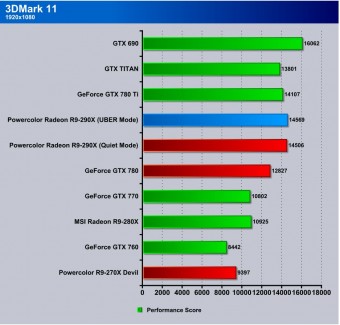
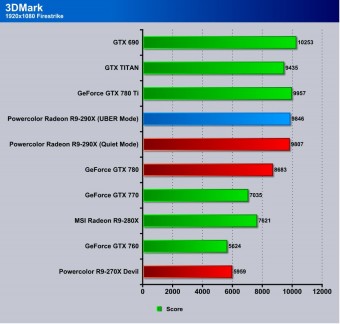
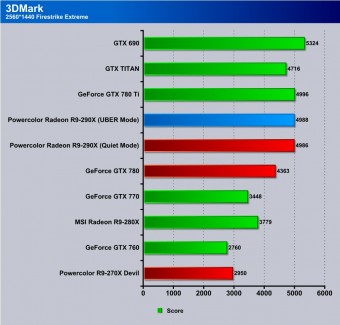
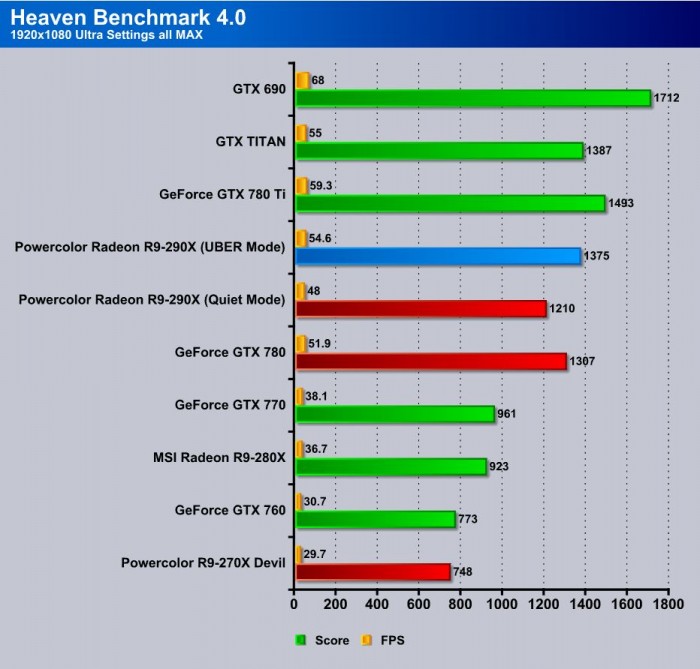
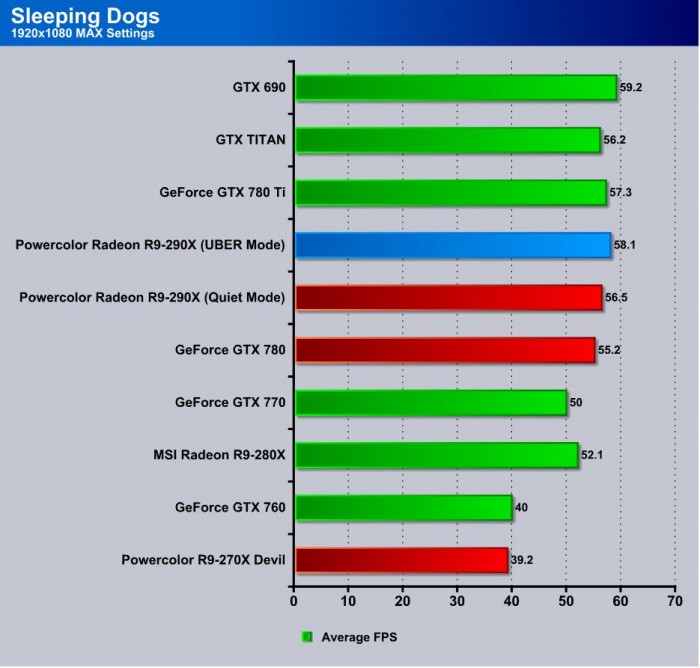
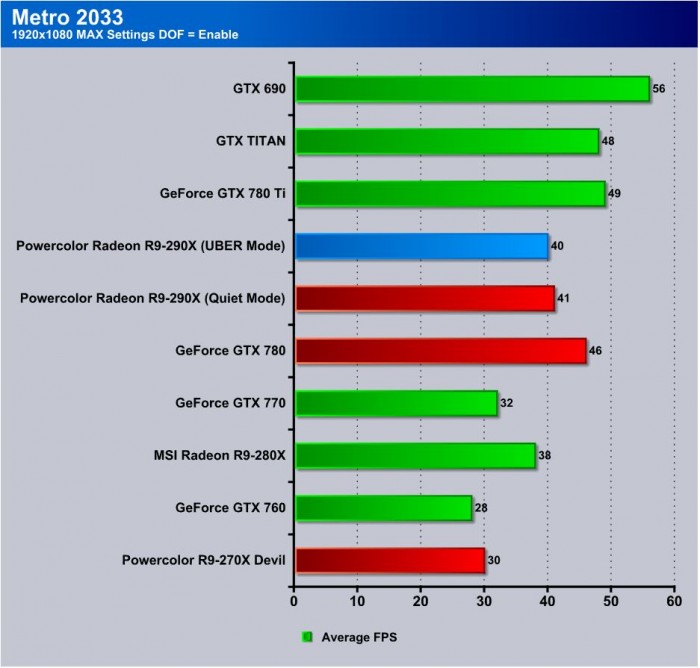
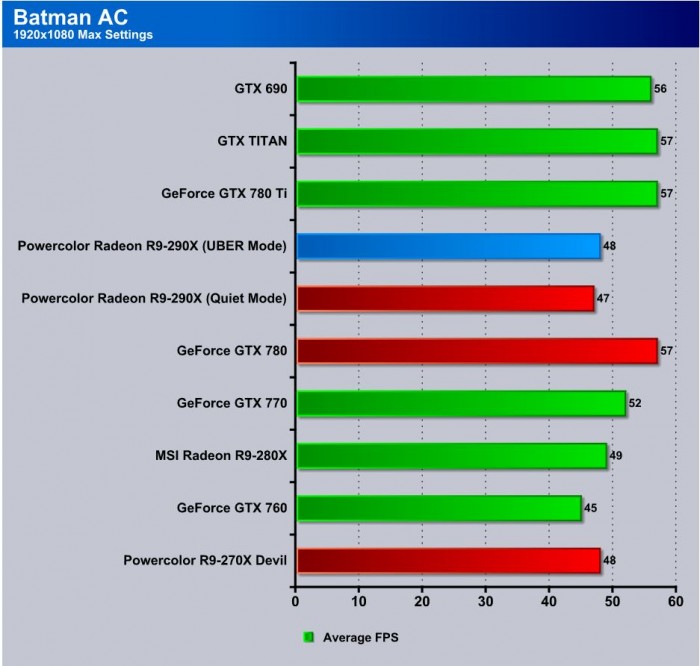
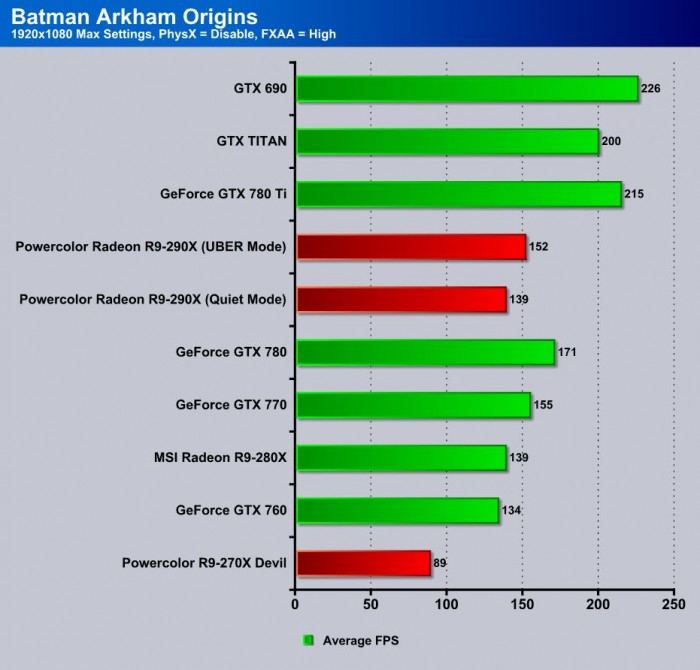
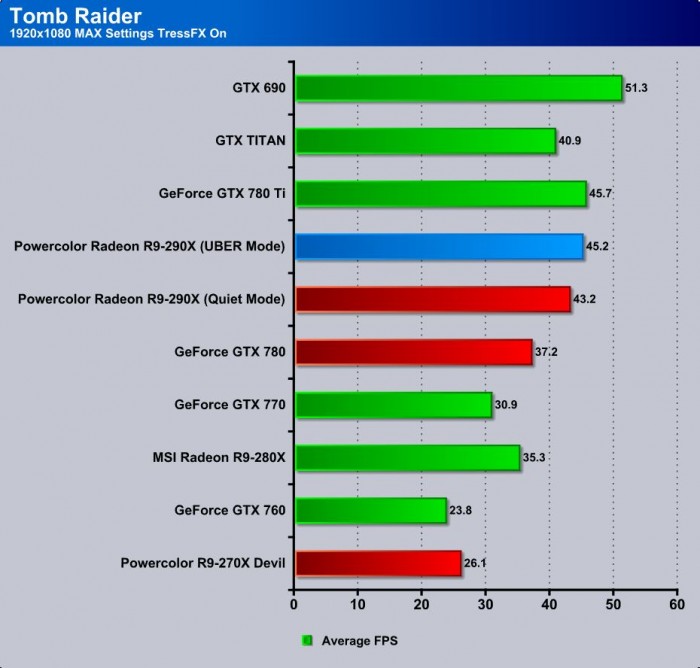
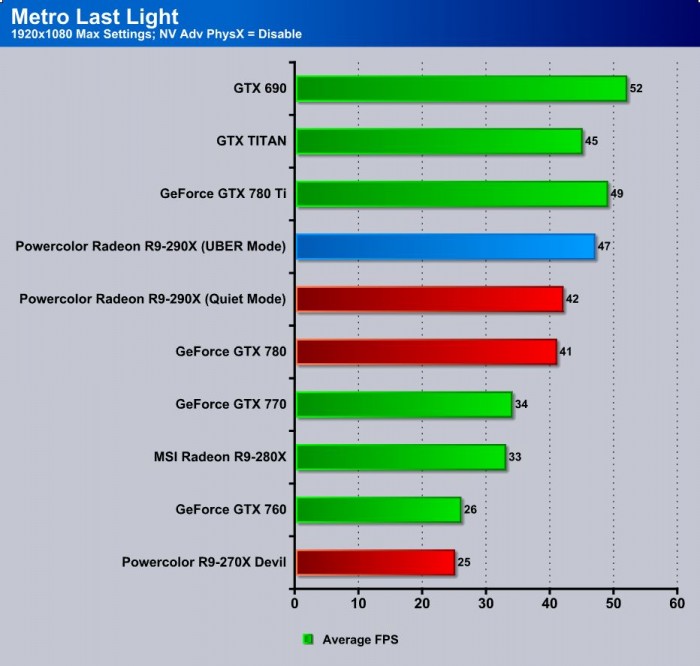
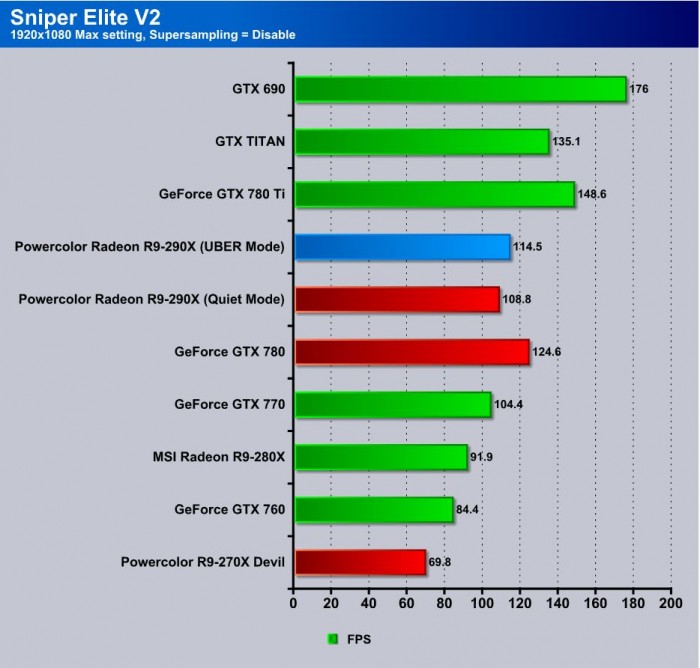
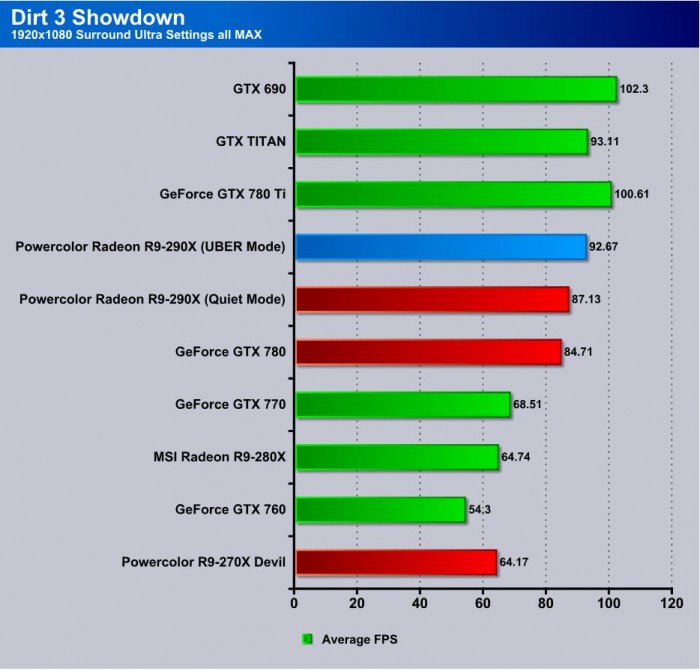

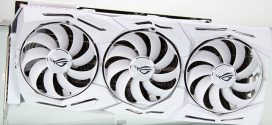

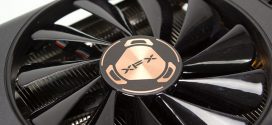




Should have just waited for a non reference cooler to review. good review, just seemed like lower performance than I was expecting compared to many others I have studied.
I’ve bought a Arctic’s Accelero Xtreme III after market cooler that I thought I would review for the site in a week or so. I will use it on a Sapphire card so it will be interesting to see how it performs compared to the cooler. Cards with non reference coolers havent actually been released as of writing so we decided to review what was available.